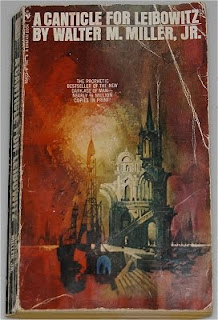We can be fairly certain that Joseph Ratzinger was not thinking of Cormac McCarthy when he wrote in 2002 that, in the face of the evil seen in the modern world, "a purely harmonious concept of beauty is not enough. It cannot stand up to the confrontation with the gravity of the questioning about God, truth and beauty." Nonetheless, that stark concept of beauty is precisely what we find in what is arguably McCarthy's greatest and most explicitly religious novel, The Road.
The book is in many ways utterly bleak - an unnamed father and son wander through a dead America in which "the frailty of everything [is] revealed at last", where cannibalism is rife and children are roasted on spits - but it is also shot through with what McCarthy calls in The Sunset Limited "the lingerin scent of divinity".
God seems at first to be utterly absent from this post-apocalyptic world - the father asks, "Are you there? ... Will I see you at the last? Have you a neck by which to throttle you? Have you a heart? Damn you eternally have you a soul? Oh God ... Oh God" - and yet His scent lingers on in the love the father has for his son and in the son himself.
The boy is in many ways the novel's central character. It is the son who retains his humanity when his father struggles to hold onto it. It is the son who compels his father to feed an old man they pass on the road, and the son who insists on returning clothes to the thief they had robbed in turn. As his father puts it, "If he is not the word of God God never spoke."
Despite the horrors he experiences the boy still "glow[s] in that waste like a tabernacle". The child is not deified - he remains a child who desperately craves reassurance and love - but he does retain a childlike religious sense. When the father stumbles across a stache of food, for example, the boy insists on thanking the (long-dead) owners for it: "Dear people, thank you for all this food and stuff. We know that you saved it for yourself and if you were here we wouldnt eat it no matter how hungry we were and we're sorry that you didn't get to eat it and we hope that you're safe in heaven with God."
The father learns many lessons from his son and the importance of prayer is just one of them. Shortly before he dies he tells his son: "If I'm not here you can still talk to me. You can talk to me and I'll talk to you. You'll see." This may not seem much like prayer as traditionally understood but it is the best he can manage in the post-Christian world they inhabit.
It is surely significant then that, at the very end of the book, when the boy finds refuge with another family, "He tried to talk to God but the best thing was to talk to his father and he did talk to him and he didnt forget. The woman said that was all right. She said that the breath of God was his breath yet though it pass from man to man through all of time."
This is a terribly bleak novel but it is also one which carries a redemptive message about hope and love. It is a novel of great narrative power, a book in which the stark of beauty of the prose style carries as much meaning as the journey itself.
In one of his very rare interviews, Cormac McCarthy disingenuously said that: "it is more important to be good than it is to be smart. That is all I can offer you." He was wrong: in The Road he offered so much more.




